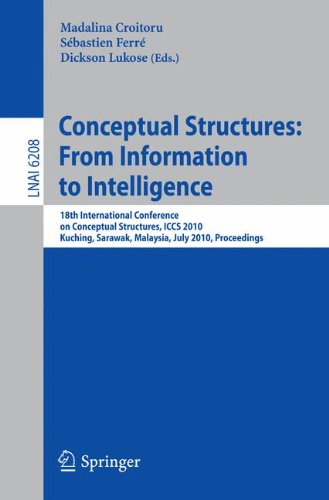

Most ebook files are in PDF format, so you can easily read them using various software such as Foxit Reader or directly on the Google Chrome browser.
Some ebook files are released by publishers in other formats such as .awz, .mobi, .epub, .fb2, etc. You may need to install specific software to read these formats on mobile/PC, such as Calibre.
Please read the tutorial at this link: https://ebookbell.com/faq
We offer FREE conversion to the popular formats you request; however, this may take some time. Therefore, right after payment, please email us, and we will try to provide the service as quickly as possible.
For some exceptional file formats or broken links (if any), please refrain from opening any disputes. Instead, email us first, and we will try to assist within a maximum of 6 hours.
EbookBell Team

4.3
28 reviewsth The 18 International Conference on Conceptual Structures (ICCS 2010) was the latest in a series of annual conferences that have been held in Europe, A- tralia, and North America since 1993. The focus of the conference has been the representation and analysis of conceptual knowledge for research and practical application. ICCS brings together researchers and practitioners in information and computer sciences as well as social science to explore novel ways that c- ceptual structures can be deployed. Arising from the research on knowledge representation and reasoning with conceptual graphs, over the years ICCS has broadened its scope to include in- vations from a wider range of theories and related practices, among them other forms of graph-based reasoning systems like RDF or existential graphs, formal concept analysis, Semantic Web technologies, ontologies, concept mapping and more. Accordingly, ICCS represents a family of approaches related to conc- tualstructuresthatbuild onthesuccesseswithtechniquesderivedfromarti?cial intelligence, knowledge representation and reasoning, applied mathematics and lattice theory, computational linguistics, conceptual modeling and design, d- grammatic reasoning and logic, intelligent systems and knowledge management. The ICCS 2010 theme “From Information to Intelligence” hints at unve- ing the reasoning capabilities of conceptual structures. Indeed, improvements in storage capacity and performance of computing infrastructure have also - fected the nature of knowledge representation and reasoning (KRR) systems, shifting their focus toward representational power and execution performance. Therefore, KRR research is now faced with a challenge of developing knowledge representation and reasoning structures optimized for such reasonings.